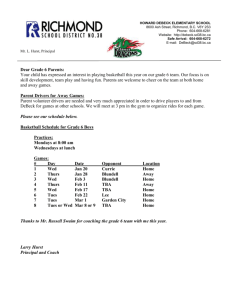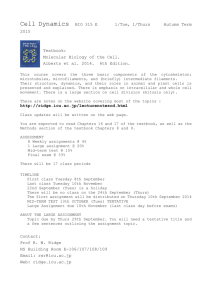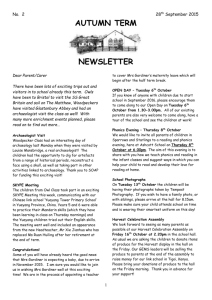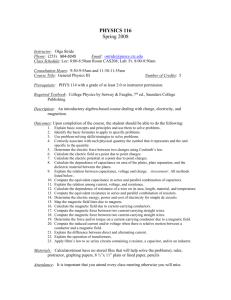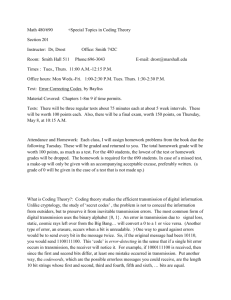More Guidelines for Final Paper
advertisement
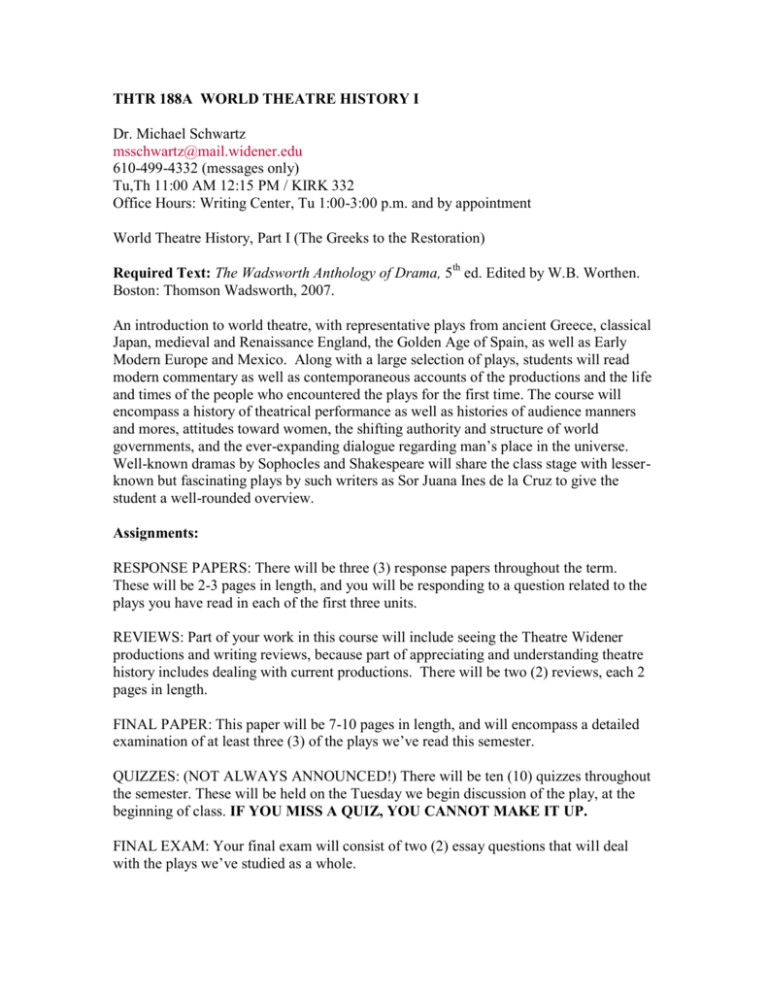
THTR 188A WORLD THEATRE HISTORY I Dr. Michael Schwartz msschwartz@mail.widener.edu 610-499-4332 (messages only) Tu,Th 11:00 AM 12:15 PM / KIRK 332 Office Hours: Writing Center, Tu 1:00-3:00 p.m. and by appointment World Theatre History, Part I (The Greeks to the Restoration) Required Text: The Wadsworth Anthology of Drama, 5th ed. Edited by W.B. Worthen. Boston: Thomson Wadsworth, 2007. An introduction to world theatre, with representative plays from ancient Greece, classical Japan, medieval and Renaissance England, the Golden Age of Spain, as well as Early Modern Europe and Mexico. Along with a large selection of plays, students will read modern commentary as well as contemporaneous accounts of the productions and the life and times of the people who encountered the plays for the first time. The course will encompass a history of theatrical performance as well as histories of audience manners and mores, attitudes toward women, the shifting authority and structure of world governments, and the ever-expanding dialogue regarding man’s place in the universe. Well-known dramas by Sophocles and Shakespeare will share the class stage with lesserknown but fascinating plays by such writers as Sor Juana Ines de la Cruz to give the student a well-rounded overview. Assignments: RESPONSE PAPERS: There will be three (3) response papers throughout the term. These will be 2-3 pages in length, and you will be responding to a question related to the plays you have read in each of the first three units. REVIEWS: Part of your work in this course will include seeing the Theatre Widener productions and writing reviews, because part of appreciating and understanding theatre history includes dealing with current productions. There will be two (2) reviews, each 2 pages in length. FINAL PAPER: This paper will be 7-10 pages in length, and will encompass a detailed examination of at least three (3) of the plays we’ve read this semester. QUIZZES: (NOT ALWAYS ANNOUNCED!) There will be ten (10) quizzes throughout the semester. These will be held on the Tuesday we begin discussion of the play, at the beginning of class. IF YOU MISS A QUIZ, YOU CANNOT MAKE IT UP. FINAL EXAM: Your final exam will consist of two (2) essay questions that will deal with the plays we’ve studied as a whole. Attendance: It sounds obvious, but you need to attend class, and you need to be on time. You may miss two (2) classes, no questions asked. If you wish an absence to be excused, you must provide me with documentation (a doctor’s note, for example). Any unexcused absences beyond the second one will reduce your grade by 2 points. Three incidents of late arrival or leaving early will count as one absence. Grades: The grades break down like this: Response papers: Reviews: Quizzes: Final Paper: Final Exam: Possible Total: A B+ B C+ C D F 30 (10 points each) 10 (5 points each) 20 (2 points each) 20 20 100 90-100 89 80-88 79 70-78 60-69 Below 60 Class Dates UNIT ONE-THE GREEKS Tues., Jan. 15 Thurs. Jan. 17 Tues. Jan. 22 Thurs. Jan. 24 Tues. Jan. 29 Thurs. Jan. 31 In-Class Introduction; syllabus and the beginnings of theatre Assignments pp. 1-22 Freaks and Greeks Aeschylus, Agamemnon p. 25 TBA 1st quiz; Agamemnon discussion Finish discussing Agamemnon 2nd quiz; discuss Oedipus Tues. Feb. 5 Discuss Sophocles and Aristotle 3rd quiz, discuss Medea Thurs. Feb. 7 Discuss Case and Euripides Tues. Feb. 12 4th quiz, discuss Lysistrata Sophocles, Oedipus the King, p. 69 Aristotle, The Poetics, p. 123 Euripides, Medea, p. 89 Case, “Classic Drag,” p. 132 Aristophanes, Lysistrata, p. 105 TBA Thurs. Feb. 14 Finish Lysistrata Tues. Feb. 19 UNIT 2: Classical Japan; 1st response paper due Thurs. Feb. 21 Tues. March 18 Thurs. March 20 Continue discussing Japanese theatre 5th quiz, discuss Chushingura Discuss Ley essay and Chushingura SPRING BREAK SPRING BREAK UNIT 3: Medieval and Renaissance England; 2nd response paper due Continue Medieval and Renaissance discussion 6th quiz; discuss Everyman Continue Everyman Tues. March 25 7th quiz; discuss Faustus Thurs. March 27 Discuss Faustus and Sidney Tues. April 1 Discuss Shakespeare Thurs. April 3 Discuss Shakespeare and Rackin Tues. April 8 UNIT 4: Early Modern Europe; 3rd response paper due Continue discussion on Early Modern Europe 8th quiz; discuss Life Is a Dream Discuss Calderon and Dryden 9th quiz; discuss Tartuffe Tues. Feb. 26 Thurs. Feb. 28 Tues. March 4 Thurs. March 6 Tues. March 11 Thurs. March 13 Thurs. April 10 Tues. April 15 Thurs. April 17 Tues. April 22 1st Response Paper due Tuesday, the 19th; Read pp. 139-154 on classical Japan Zeami, “A Mirror Held to the Flower,” p. 182 Chushingura: The FortySeven Samurai, p. 162 Ley, “Aristotle’s Poetics…” p. 192 2nd response paper due Tuesday, March 11 pp. 207-228 on Medieval and Renaissance England Everyman, p. 244 TBA Marlowe, Doctor Faustus, p. 255 Sidney, “Apology for Poetry,” p. 359 Shakespeare, The Tempest, p. 330 Rackin, “Misogyny is Everywhere,” p. 361 3rd response paper due, Tuesday, April 8, read pp. 373-386 on Early Modern Europe TBA Calderon, Life Is a Dream, p. 387 Dryden, “Preface to Troilus…” p. 508 Moliere, Tartuffe, p. 414 Maus, “Playhouse Flesh and Blood,” p. 518 Thurs. April 24 Discuss Moliere and Maus Tues. April 29 10th quiz; final paper due; discuss Sor Juana and final exam Final Exam: TBA Sor Juana, Loa to the Divine Narcissus, p. 499; Final Paper due next class LAST CLASS


